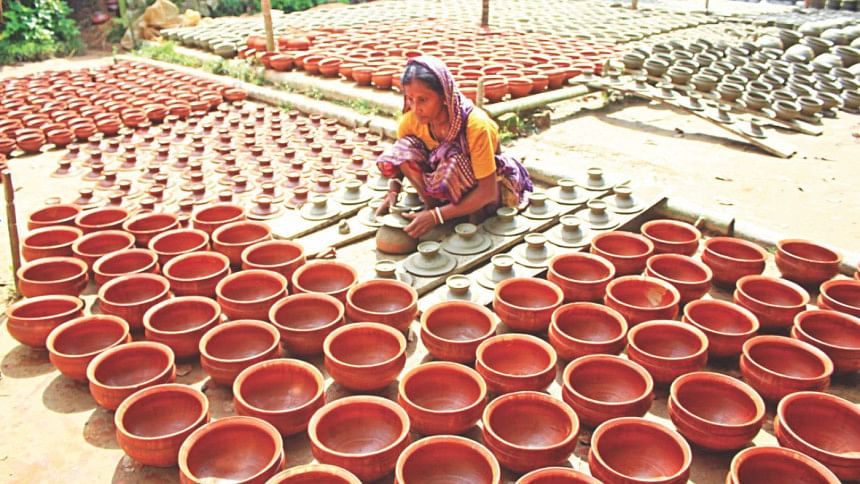Barisal women doing double duty

Even though the female potters in Barisal district are involved with the trade from primary to its finishing stage, in addition to taking care of their families, their contributions remain mostly unacknowledged and they are deprived of their professional recognition.
This correspondent recently visited places in Bakerganj and Agailjhara upazilas which basically represent the overall pottery situation of the district.
In Moheshpur Paul Para of Bakerganj, where at least 200 families are engaged in this profession, it was found that women, who are almost half of them, were busy making different items like -- curd pots, tali pots, chari, flower tubs and vases -- with clay on their house premises.
On top of doing their household chores, the women have been working from morning to evening for decades making these pots but still are unaware of their rights as no government or non-government organisation work there to inculcate their spirit.
“Before marriage, we used to help our fathers in making clay items while after getting married we work for our husbands,” said Juti Rani Paul, a resident of Paul Para.
All they know that they have to support their families. “We want our children to go to schools. We want to change our fate,” said Sumoti Rani Paul of the same area.
When asked about the contributions of women, a male potter, Madhusudan Paul, said, “They (women) mould clay, give them different shapes and dry in the sun. And after finishing the rest of the work, we sell those in the market.”
Shibu Paul of Gaila Paul Para in Agailjhara upazila said, “Our family members -- both men and women -- work together to make pottery items and idols and it is the tradition of our community. The female members have always played the main role.”
But, Buli Rani Paul of the area said, “We do not receive any money...”
Meanwhile, the clay artisan community is losing interest in continuing the business as their items often remain unsold.
“We used to collect clay from the nearby riverbank. We buy a boat of soil at Tk 7,000,” said Dilip Paul of Maheshpur, adding, “It is difficult to sell those now.”
Plastic pots and containers are usually sold at a cheaper rate and customers consider those more convenient in comparison to the clay ones, said another potter, Dipak Chandra Paul of the area.
“We generally make 2,000 curd pots in a week with a production cost of Tk 5,000. And the market price is Tk 10,000,” he said, adding, “But we cannot make such profit anymore as most of them remain unsold.”
Many have already left this profession, said another craftsman, Laxsman Paul. “With low profit our financial situation is steadily deteriorating over the past few years,” he said, adding, “We did not receive assistance from any government.”
To uphold the image of pottery in the country, the community needs training as well as economic assistance, said Bappy Majumder, member secretary of Mritshilpi Sammelon o Sammanona, which awards the potters for their professional contributions to encourage them.

 For all latest news, follow The Daily Star's Google News channel.
For all latest news, follow The Daily Star's Google News channel. 



Comments